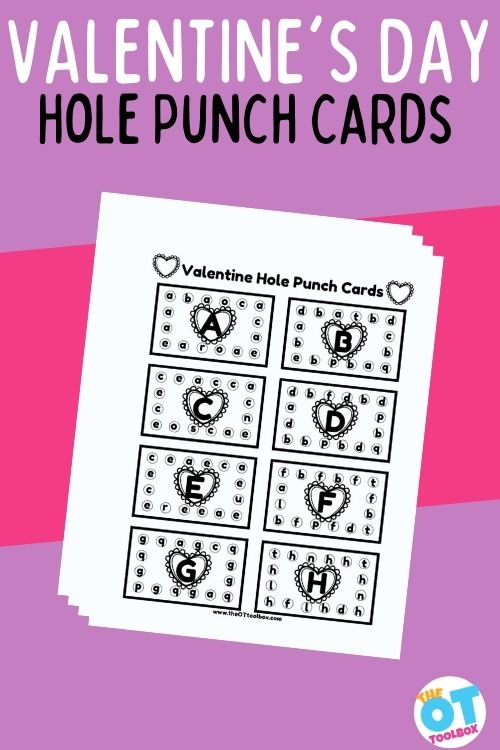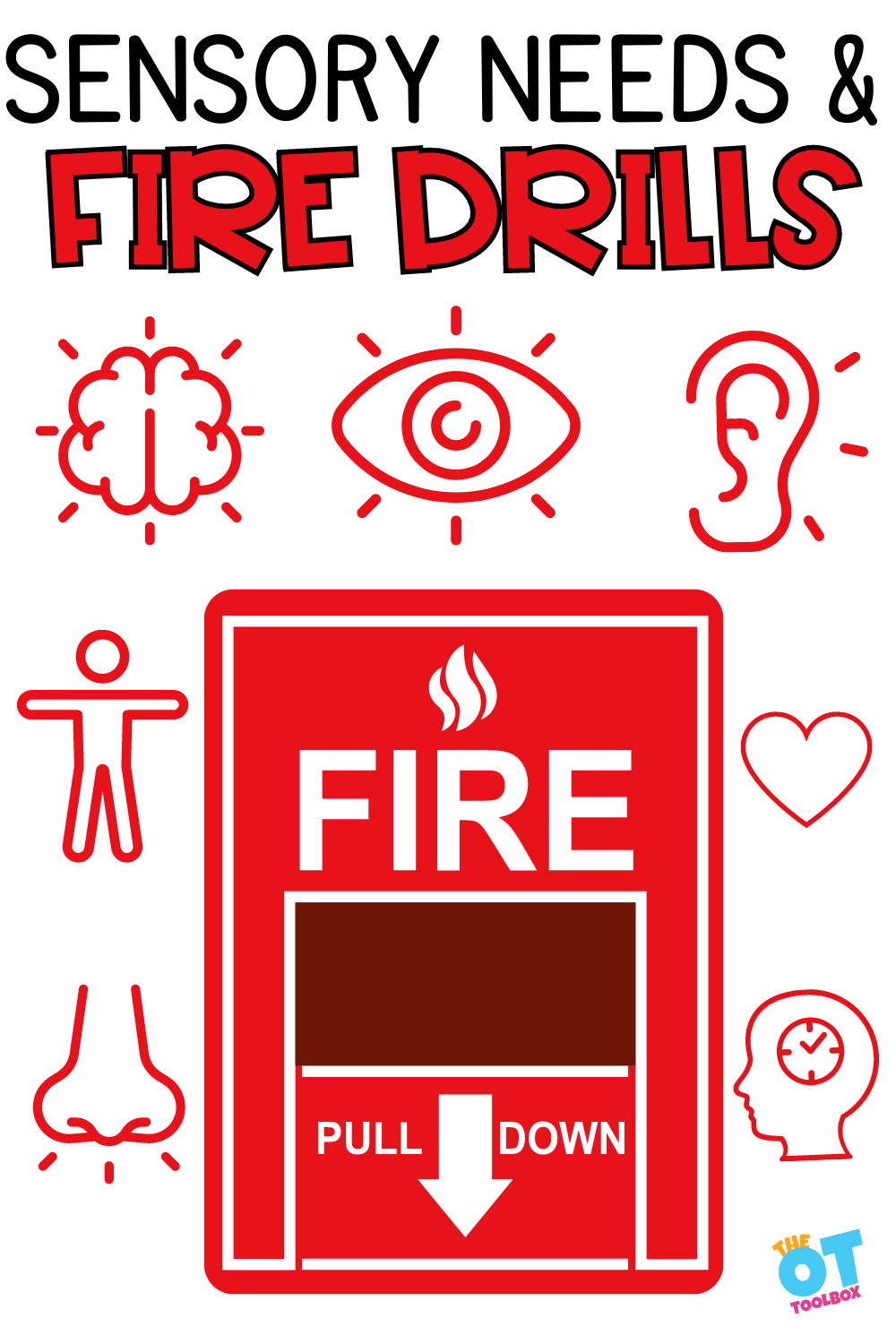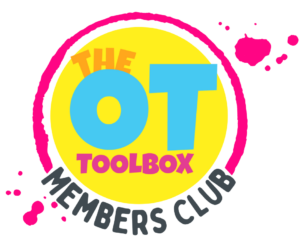Today’s post is highlighting a new activity, the Valentines Hole Punch Card. This is a great tool to add to your Valentine’s Day occupational therapy activities, while using a hand strengthening activity with a heart theme.
There has long been a debate about the validity of Valentine’s day. Some claim it to be a “Hallmark Holiday,” for the greeting card companies to make a quick buck. I would venture a guess that women like it more than men. Men tend to see any sort of shopping or gift giving as a chore, and this is just one more on the list. Women see this as another opportunity to receive something special, wrapped up in a tiny box. I see it as a way to break up the long winter between New Years and Easter.
Be sure to grab these printable Valentine’s Day cards, too!

Why do children like Valentine’s day? It is not writing out cards or focusing on letters, but candy of course! Any opportunity to get candy is a welcomed treat for most young people. Now that we have established who is in favor, and who is opposed to this holiday, let’s focus on entertaining and celebrating with the children, since we KNOW they appreciate a good Valentine.
Valentines activities hole punch CARD
Since not many goals are accomplished purely from unwrapping and eating candy, there needs to be motivating ways to encourage learners to work on skills such as fine and visual motor, social function, and behavior. Combining fun holidays with activities like the Valentines Letter Hole Punch Cards, into your lesson plan, is a great way to help reluctant learners agree to participate in non favored activities.
The OT Toolbox has a kit of VALENTINE’S DAY FINE MOTOR ACTIVITIES to add to your lesson plan. This is a print-and-go packet of resources designed to build fine motor strength and coordination.
Ways to use and modify this valentines letter hole punch card task:
- Use traditional and alternative types of hole punchers to build hand strength and dexterity, while matching the letters
- Use crayons to mark the matching letters
- Dot markers can be used to dot the correct letters.
- Pages can be colored and cut out, glued onto larger sheets and decorated
- Enlarge or shrink this page to change the level of difficulty
- Change the type of paper, heavier weight is easier to handle, but may be harder to punch through
- Colored paper might be more motivating, or provide better contrast
- Project this onto a smart board to make it a touch task or have students follow along with the diagram
- For learners who do not know their letters yet, this will be more of a shape matching task than letter recognition
- Create a booklet of all the letter pages, tackling a couple each day
- Make a Valentines lesson plan around each letter for the day including writing the letters, reading about letters, identifying items that start with each letter, and learning the letter sounds
- Add a Valentine’s Day Handwriting Slide Deck to your plan to make it even more motivating for your learners
What skills does this Valentine hole punch worksheet address?
- Fine motor skills: manual dexterity to hold and used the hole punch, coloring and drawing if designing the activity for writing
- Strength: core strength, hand and wrist stability. Using a hole punch improves the intrinsic hand muscles critical for writing and cutting skills
- Bilateral coordination: using one hand for punching or cutting, while the “helper hand” supports the paper. Keep an eye one which hand is primarily used as the dominant side
- Visual perception: figure ground to pick out the correct letters from the field of many. Scanning to correctly find all of the letters. Visual memory to remember what letters have been looked at already. Form constancy to recognize the letters in their different forms or sizes
- Executive function/behavior/social skills: Following directions, attention to detail, turn taking, waiting, social skills, compliance, behavior, and work tolerance
- Cutting on the line ( if you choose to add this step), within half inch of lines, in the direction of lines
When working on this Valentine letter hole punch activity, there are several observations that can be made:
- Can your learner scan the page to identify the correct letters? Are they recognizing what they are matching or merely matching shapes?
- How many items can your learner correctly match?
- Can your learner correctly hold and manipulate the hole punch? How much assistance do they need to grip the puncher and punch the holes?
- Can your student continue to hold the puncher while trying to manipulate the paper?
- How many times do you need to repeat the directions so your learner can follow them?
- How many reminders does your learner need while doing this activity?
- What is your learner’s frustration tolerance when they make a mistake or cannot accurately do this task?
- What types of modifications and adaptations were needed for your learner to be successful?
- Is there any cheating or cutting corners going on? There always is.
For more great learning opportunities, click on this: Valentine’s Fine Motor Skills post from 2021
The best laid plans are multi-dimensional. The OT Toolbox has many options for varying your treatment plans, including fine and gross motor, social, coordination, strengthening, and sensory activities.
The OT Toolbox has a Valentine’s day sensory BIN to add to your Valentine treatment ideas
Free Valentine’s Day Hole Punch Cards
Thankfully the OT Toolbox has you covered this month! Today’s activity is no exception. We are rolling out several Valentine related activities for preschool, kindergarten, and entry level learners. While these are appropriate for young learners, they are also great for beginning or early level learners of all ages. Some learners as old as high school can benefit from this type of task if this is their fine motor or cognitive level.
This Valentine Hole Punch Card Activity Sheet is an excellent way to work on multiple skills at once, while creating a cute take home worksheet packet.
Enter your email address into the form below to access this Valentine’s Day hole punch card.
Now that Valentine’s Day is on the horizon, I am off to find some of that candy!
YUM – Victoria Wood

Victoria Wood, OTR/L is a contributor to The OT Toolbox and has been providing Occupational Therapy treatment in pediatrics for more than 25 years. She has practiced in hospital settings (inpatient, outpatient, NICU, PICU), school systems, and outpatient clinics in several states. She has treated hundreds of children with various sensory processing dysfunction in the areas of behavior, gross/fine motor skills, social skills and self-care. Ms. Wood has also been a featured speaker at seminars, webinars, and school staff development training. She is the author of Seeing your Home and Community with Sensory Eyes.
*The term, “learner” is used throughout this post for readability, however this information is relevant for students, patients, clients, children of all ages, etc. The term “they” is used instead of he/she to be inclusive.


